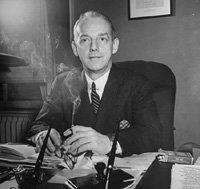The History of Business Law at Yale

Randolph E. Paul, Visiting Sterling Lecturer, 1937-43
Randolph Paul (1890-1956) was one of the architects of the federal income tax. An advocate of the expansion of federal taxes during World War II, he served first as an informal advisor to the Treasury Department on tax issues in the late 1930s and early 1940s. He assumed a full time position after the attack on Pearl Harbor, becoming General Counsel to the Treasury in August 1942. During the years when he was lecturing at the Law School, in addition to engaging in private tax practice, serving as a director of the Federal Reserve Bank in New York and providing advice to the Treasury Department, he published a series of influential works on federal taxation, including Studies in Federal Taxation (1937, 1938, 1940), and Federal Estate and Gift Taxation (1942). As Treasury General Counsel, he advocated a broad income tax, both as a revenue producer to finance the war effort, and as a tool for regulating the economy. He contended that an income tax expanded to include the middle class was more equitable, as well as more reliable as a revenue stream to meet war needs, than a national sales tax, an alternative being promoted by members of Congress, among others, at the time.
In 1944, Paul left the Treasury Department to found the New York law firm Paul, Weiss, Rifkind, Wharton & Garrison.